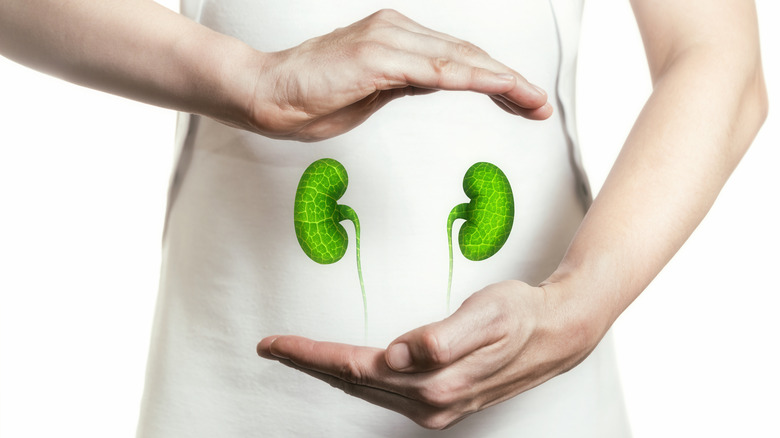The First Thing You Should Do After A Kidney Stone Passes
If you've recently passed a kidney stone, you know it's no easy task. Many of us are aware of the painful process of passing a kidney stone. However, what they actually are and what to expect after you pass a stone aren't often discussed. According to the Urology Care Foundation, a kidney stone is a formation built from the salts and minerals found in our urine. The higher the levels of salts and minerals in your urine, the more at risk you are for developing a kidney stone. The cluster can start out as small and grow larger in size. If the stone stays in your kidney, it may not cause any problems. If it travels down the ureter into your bladder or becomes lodged in your ureter, urinating can become difficult and painful.
If you've dealt with the unpleasant passing of kidney stones before, know that you are not alone. The National Kidney Foundation estimates at least 1 in 10 people will develop a kidney stone at some point in their lives. Nearly half a million people visit the emergency room because of symptoms associated with having a kidney stone.
It is possible to find out why you had kidney stones
We know that it can be painful to pass, they are made up of the salts and minerals from our urine, and that they are a common problem — but what should you do once you are rid of the kidney stone?
Once you pass a kidney stone, you can flush it down the toilet. If you get them often or are curious as to why a stone formed in the first place, you can get the stone and your urine analyzed by your doctor. Understanding why you developed the kidney stone can help you take preventative measures in the future. To collect the stone, Fairview recommends urinating into a jar for 24 hours and then pouring your urine through a strainer to collect one or multiple stones. If you don't collect the stone, you can still bring in a urine sample that was taken within 24 hours of passing a kidney stone to be analyzed.
There are some symptoms you shouldn't ignore
If you do not wish to find out more about your condition, it can still be helpful to prepare for what may come next. Healthline notes that you should be aware that there could be lingering pain, or even another stone needing to pass. If you were on any prescribed medication to help you manage your kidney stone pain, the medicine may cause side effects, such as constipation and abdominal bloating. Lingering pain and other side effects may be common. Contact your doctor if you have recently passed a kidney stone and are experiencing the following symptoms: chills, swelling of the legs, urine that is cloudy in color, or a painful burning sensation while peeing.
Kidney stones are often portrayed lightly or in a joking manner in the media. If you have one or many stones you are currently trying to pass, know that you can take preventative measures in the future by delivering samples to your doctor.



